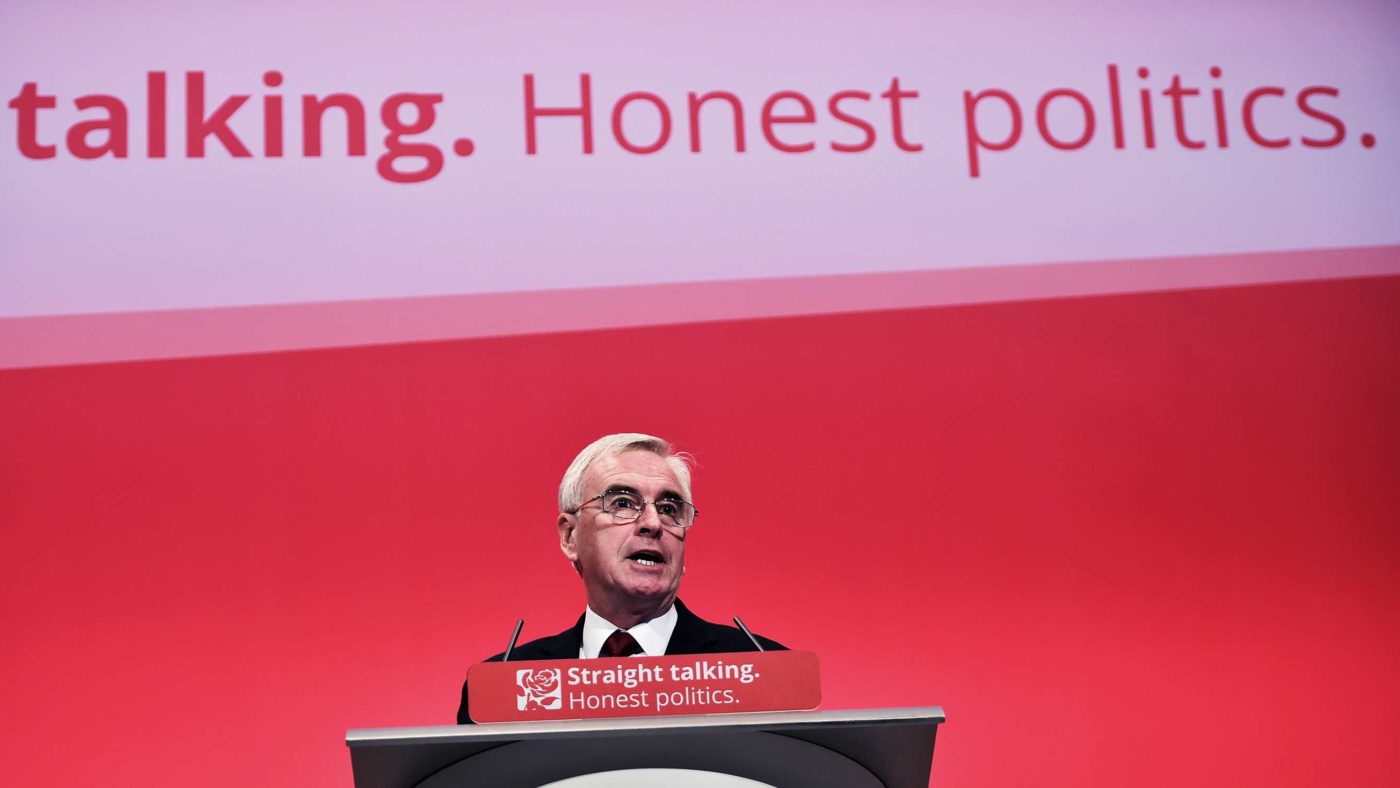John McDonnell’s big plan for employee ownership appears to have hit the buffers less than a month after it was announced to great fanfare at Labour conference. The idea was that 10 per cent of large companies’ shares would be handed over to staff in an “inclusive ownership fund” – a sort of socialist take on popular capitalism.
Fast-forward a few weeks and McDonnell already sounds open to ditching the proposal.
“You tell me another way of doing that that’s practical, pragmatic and in line with our objective then great, we’ll listen,” the Shadow Chancellor told an audience of businesspeople yesterday.
He offered to junk what was meant to be one of his flagship policies remarkably breezily.
Part of the explanation may be that from almost the moment the policy was trailed, its gaping flaws were clear for all to see. The proposals were replete with loopholes and question marks: would foreign-listed companies be affected? What would happen if a company was taken over?
Understandably, Labour peddled the line that this would be an “ownership” revolution, even though workers would own nothing new, instead getting a maximum of £500 a year, with the Treasury creaming off the rest as a “social dividend”, or what you and I might call “tax”.
As the Guardian’s Nils Pratley points out, if McDonnell’s policy had been applied to Lloyd’s Bank last year, its staff would have ended up with £34m and the Treasury would have collected the rather more handsome sum of £185m. It would also have been manifestly unfair on those working for firms with under 250 staff, who would get no such juicy bonuses.
What are we to make, then, of what looks very much like the beginnings of a U-turn?
On the one hand, it may be a sign that Labour’s policies are finally coming in for some proper scrutiny. Jeremy Corbyn largely got away with it during last year’s general election campaign, thanks to a widespread perception that he had no chance of winning, and an understandable focus on just how awfully things were going for Theresa May.
Then again, the political class is so thoroughly distracted by the Brexit negotiations at the moment that Labour could propose to concrete over the Thames and it would only make headlines for a day or two.
Another possibility is that McDonnell is not too hung up on the details of these kinds of policies because they are simply a means to an end – making him seem a plausible, serious, almost avuncular figure who can be trusted with his hand on the nation’s tiller.
McDonnell’s reinvention from mace-wielding Marxist to friendly neighbourhood bank manager is one of the more remarkable pieces of political feng shui in recent times. That it he has got away with it is mainly thanks to the even more remarkable story of a shouty throwback-bencher becoming the unassailable leader of the Labour Party.
But make no mistake, no matter how many cups of tea he has with fund managers, McDonnell cannot be trusted with the nation’s finances.
As CapX’s editor Oliver Wiseman has rightly noted, this is still the man who said of the 2008 crash: “I’ve been waiting for this for a generation…for Christ’s sake don’t waste it. Let’s use this to explain to people this system based on greed and profit doesn’t work”.
McDonnell is too canny a creature to propose full-blown collectivist revolution to a British public who care about wages, taxes and public services, not ideology. After all, public enthusiasm for policies such as renationalising the operation of the railways owes far less to ideological zeal than people thinking they are getting a shoddy deal.
With that in mind, McDonnell has so far resisted his true political instincts in favour of a kind of souped-up Milibandism, shorn of the tortured triangulation and uncertainty that typified the former Labour leader.
But McDonnell is no soft left social democrat and these policies would just be the start if he and Corbyn managed to get into Downing Street. That may be the real reason the Shadow Chancellor does not seem particularly attached to policies such as the “inclusive ownership fund” — they are just an amuse bouche for an altogether more radical agenda that would present a clear and present danger to British prosperity.
It’s not just McDonnell, of course. Corbyn’s top team includes the likes of Andrew ‘Class War’ Fisher and North Korea enthusiast Andrew Murray.
The Times columnist and Conservative member of the House of Lords Danny Finkelstein crystallised this fear over McDonnell and co’s real intent when he told a recent CapX event: “What worries me is not their radicalism, but their modesty… they’ve understood that they need to keep the initial offer quite limited – John McDonnell is clever enough to understand that.”
McDonnell is clever indeed, and all the more dangerous because of it.


